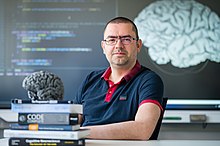Sven Apel (born 1977) is a German computer scientist and professor of software engineering at Saarland University.
Sven Apel | |
|---|---|
 Photo of Prof. Dr. Sven Apel | |
| Born | 1970 (age 53–54) |
| Occupation | Professor of computer science |
| Title | Professor |
| Academic background | |
| Alma mater | Otto von Guericke University Magdeburg |
| Thesis | The Role of Features and Aspects in Software Development (2007) |
| Academic work | |
| Discipline | Computer science |
| Sub-discipline | Software engineering |
| Institutions | Saarland University |
| Website | www |
His research focuses on software product lines and configurable systems, domain-specific generation and optimization, software analytics and intelligence, as well as empirical methods and the human factor in software development.[1]
Education and career
editSven Apel studied computer science at the University of Magdeburg from 1996 to 2002. At the same university, he also received his doctorate in computer science in 2007 with a thesis on the “Role of Features and Aspects in Software Development.”[2][3]
After his doctorate, Apel was a postdoctoral researcher at the University of Passau until 2010. From 2010 to 2013, he led the Emmy Noether Junior Research Group “Secure and Efficient Software Product Lines”[4] there before he was appointed professor in Passau in 2013 as part of the DFG's Heisenberg Program.[2]
Since 2019, Sven Apel has been a professor of software engineering at Saarland University.[2]
In 2019, Apel, together with Christian Kästner and Martin Kuhlemann, received the “Most Influential Paper Award” at the Systems and Software Products Line Conference (SPLC) for the paper “Granularity in Software Product Lines”.[5] In the article, the three researchers demonstrate how programs can be extended by fine-grained import from other software.[6]
In 2022, together with Janet Feigenspan, Christian Kästner, Jörg Liebig and Stefan Hanenberg, he was awarded the “Most Influential Paper Award” at the International Conference on Program Comprehension (ICPC) for the paper “Measuring programming experience”.[7] In the article, the researchers present a questionnaire and an experiment to assess and measure a programmer's level of experience.[8]
According to Google Scholar, he has an h-index of 69.[9]
Research areas
editSven Apel's research focuses in particular on methods, tools, and theories for the construction of manageable, reliable, efficient, configurable, and evolvable software systems.[10]
In addition to the technical aspects, the human and social factors in software development also play an important role for him. For example, he investigates program comprehension with the help of neurophysiological measurements, such as functional magnetic resonance imaging (fMRI).[11]
Awards
edit- 2007: Ernst Denert Software Engineering Prize[12]
- 2013: Heisenberg Professorship with focus on software development, in particular automatic software construction[13]
- 2015: Member of the Young Academy of Europe[14]
- 2016: Hugo Junkers Award for Research and Innovation from Saxony-Anhalt[15]
- 2018: ACM Distinguished Member for outstanding scientific contributions to computing[16]
- 2019: “Most Influential Paper Award” of the Systems and Software Products Line Conference (SPLC)[5]
- 2022: “Most Influential Paper Award” of the International Conference on Program Comprehension (ICPC)[7]
- 2022: ERC Advanced Grant “Brains on Code”[17]
References
edit- ^ "Sven Apel, Professor, Saarland University". Saarland Informatics Campus. Retrieved 2022-11-10.
- ^ a b c Apel, Sven: Curriculum Vitae. Retrieved 2022-11-10.
- ^ Apel, Sven (2007). The role of features and aspects in software development similarities, differences, and synergetic potential. Saarbrücken. ISBN 978-3-8364-3344-0. OCLC 254569755.
{{cite book}}: CS1 maint: location missing publisher (link) - ^ "DFG - GEPRIS - Sichere und effiziente Softwareproduktlinien". Deutsche Forschungsgemeinschaft (DFG). Retrieved 2022-11-10.
- ^ a b Bolduan, Gordon (2019-10-01). "Most Influential Paper Award: Producing software like cars in product lines". EurekAlert!. Retrieved 2022-11-10.
- ^ Kästner, Christian; Apel, Sven; Kuhlemann, Martin (2008). "Granularity in software product lines". Proceedings of the 13th international conference on Software engineering - ICSE '08. Leipzig, Germany: ACM Press. pp. 311–320. doi:10.1145/1368088.1368131. ISBN 978-1-60558-079-1. S2CID 10812422.
- ^ a b Zapf-Schramm, Philipp (2022-05-17). "Saarbrücken computer scientist honored for influential research on program comprehension". Saarland Informatics Campus. Retrieved 2022-11-10.
- ^ Feigenspan, Janet; Kästner, Christian; Liebig, Jörg; Apel, Sven; Hanenberg, Stefan (June 2012). "Measuring programming experience". 2012 20th IEEE International Conference on Program Comprehension (ICPC). pp. 73–82. doi:10.1109/ICPC.2012.6240511. ISBN 978-1-4673-1216-5. S2CID 1306566.
- ^ "Sven Apel". Google Scholar. Retrieved 2022-11-10.
- ^ Apel, Sven; Batory, Don; Kästner, Christian; Saake, Gunter (2013). Feature-Oriented Software Product Lines. Berlin, Heidelberg: Springer Berlin Heidelberg. doi:10.1007/978-3-642-37521-7. ISBN 978-3-642-37520-0. S2CID 28767337.
- ^ Siegmund, Janet; Kästner, Christian; Apel, Sven; Parnin, Chris; Bethmann, Anja; Leich, Thomas; Saake, Gunter; Brechmann, André (2014-05-31). "Understanding understanding source code with functional magnetic resonance imaging". Proceedings of the 36th International Conference on Software Engineering. Hyderabad India: ACM. pp. 378–389. doi:10.1145/2568225.2568252. ISBN 978-1-4503-2756-5. S2CID 2407216.
- ^ "Bisherige Preisträger des Ernst-Denert Se-Preis". Gesellschaft für Informatik - Fachbereich Softwaretechnik. Retrieved 2022-11-10.
- ^ Katrina, Jordan (2013-08-05). "Sven Apel erhält Heisenberg-Professur". Universität Passau (in German). Retrieved 2022-11-10.
- ^ "Apel". Young Academy of Europe. 2016-12-19. Retrieved 2022-11-10.
- ^ "Hugo-Junkers-Preis für Forschung und Innovation aus Sachsen-Anhalt: Preisträger 2016". 2017-07-31. Archived from the original on 2017-07-31. Retrieved 2022-11-10.
- ^ "Sven Apel". Association for Computing Machinery. 2018-11-07. Retrieved 2022-11-10.
- ^ Zapf-Schramm, Philipp (2022-04-26). "EU-Millionenförderung für Pionier-Forschung zur Hirnaktivität beim Verstehen von Programmcode". Universität des Saarlandes (in German). Retrieved 2022-11-10.